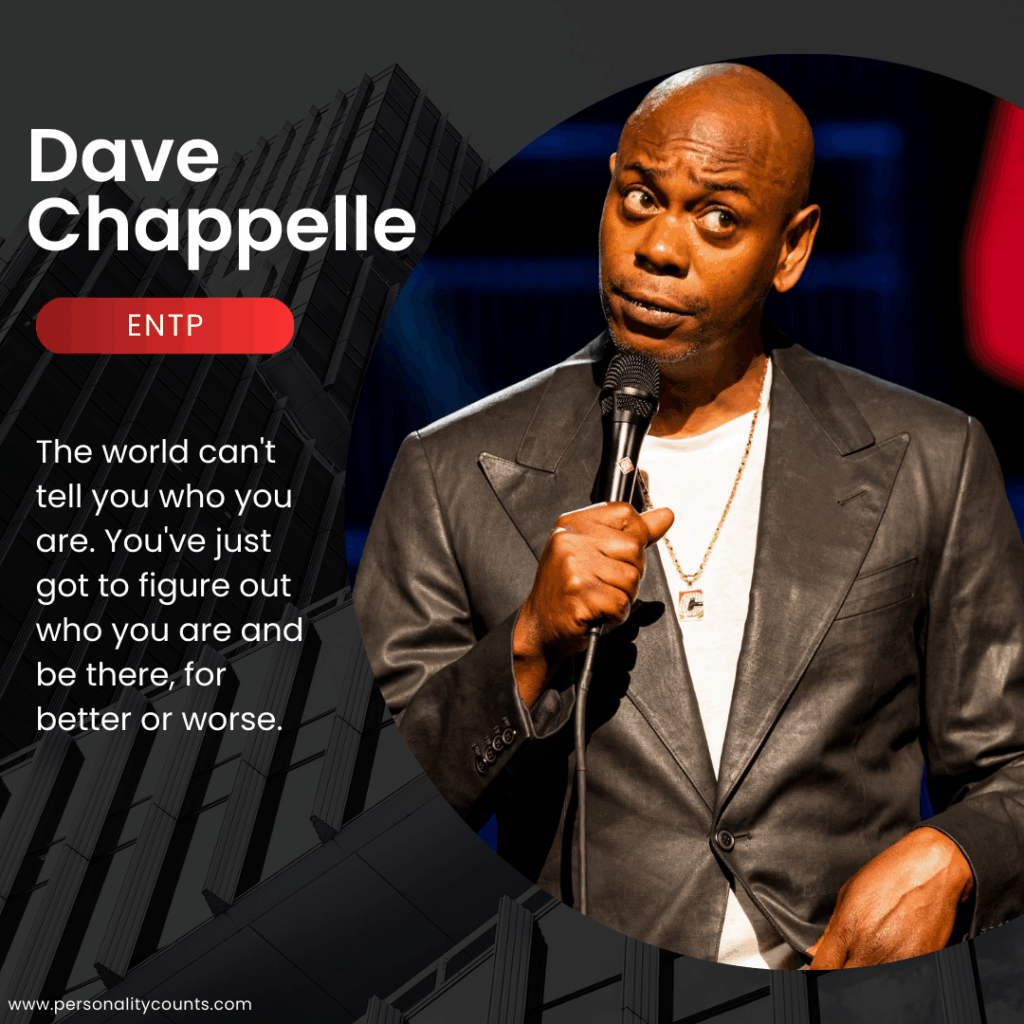
ENTP
ENTPs are quick-witted, energetic personalities who love exploring ideas from every angle. They’re the ones who can turn an ordinary conversation into something funny, thought-provoking, and a little uncomfortable—in the best way. Dave Chappelle embodies this spirit. From his breakout as a young comic to his groundbreaking Chappelle’s Show and his bold return to stand-up, Chappelle has always thrived by shaking things up and making audiences look at the world differently.
Origins and Early Career
Dave Chappelle was born in Washington, D.C., and raised in Silver Spring, Maryland, in a household shaped by academics—his mother was a professor and his father a dean. Growing up in this environment, he developed a sharp mind and a taste for intellectual exploration, both of which would later infuse his comedy.
As a teenager, he moved to New York City to pursue stand-up. His early years performing in comedy clubs showed off his Extraverted Intuition (Ne)—jumping from idea to idea, improvising with the crowd, and spotting patterns that others missed. By his early 20s, he was already appearing on Def Comedy Jam and acting in films like Robin Hood: Men in Tights and Half Baked, blending observational humor with satire.
Rise to Fame – Chappelle’s Show
In 2003, Chappelle made comedy history with Chappelle’s Show on Comedy Central. The series combined fearless sketches with sharp social commentary, tackling race, politics, and culture in ways that were hilarious, uncomfortable, and unforgettable.
This was classic ENTP energy: testing boundaries, pushing debates into new territory, and thriving on the tension between laughter and reflection. Sketches like “Rick James” and “Charlie Murphy’s True Hollywood Stories” became cultural landmarks, but beyond the punchlines, it was Chappelle’s ability to spark dialogue that made the show legendary.
The Bold Exit and Comeback
At the height of his success in 2005, Chappelle stunned the entertainment world by walking away from a $50 million contract and retreating to South Africa. For many, it seemed unthinkable. For an ENTP, it was a refusal to be boxed in. ENTPs value freedom, authenticity, and creative control. When they feel restricted, they’re more likely to walk away and reinvent than stay trapped in a system that limits their vision.
Years later, Chappelle returned to the stage with a new wave of stand-up specials, many of which became Netflix’s most-watched comedy events. His comeback proved what ENTPs do best: adapt, evolve, and stay relevant by constantly reinventing themselves.
ENTP Cognitive Functions in Dave Chappelle
- Ne (Extraverted Intuition) – Lead Function
Chappelle thrives on exploring ideas, making unexpected connections, and spinning ordinary observations into comedy gold. His routines often leap between topics, surprising audiences with where he takes them. - Ti (Introverted Thinking) – Secondary Function
Beneath the improvisation is sharp logic. Chappelle uses Ti to dissect contradictions in society, building his routines around why certain norms don’t make sense. - Fe (Extraverted Feeling) – Tertiary Function
Though provocative, Chappelle knows how to read the room. His timing, delivery, and ability to tap into shared emotions show how he connects with audiences, even when addressing sensitive topics. - Si (Introverted Sensing) – Inferior Function
ENTPs often resist tradition, preferring innovation. Chappelle’s exit from Chappelle’s Show is a clear example of clashing with rigid structures. Still, his callbacks to cultural history show Si’s subtle influence in his work.
Interesting Facts About Dave Chappelle
- Began stand-up at 14 years old in New York clubs.
- Appeared on Def Comedy Jam in the 1990s, earning respect from established comedians.
- Won multiple Emmy Awards and Grammy Awards for his specials.
- Lives in Yellow Springs, Ohio, far from the Hollywood spotlight.
- Hosted Saturday Night Live after the 2016 and 2020 elections, delivering monologues that blended humor with social critique.
Lessons Fans Can Learn from Dave Chappelle
- Challenge the system – true innovation comes from questioning norms.
- Stay adaptable – success often comes through reinvention.
- Use humor as a tool – laughter can spark conversations about serious issues.
- Protect your authenticity – ENTPs thrive when they stay true to themselves, even if it means taking risks.
Famous Quotes
“The hardest thing to do is to be true to yourself, especially when everybody is watching.”
Captures the ENTP drive for authenticity over conformity.
“The truth is, everyone’s going to hurt you. You just got to find the ones worth suffering for.”
A witty yet poignant reflection of the ENTP’s mix of honesty and humor.
